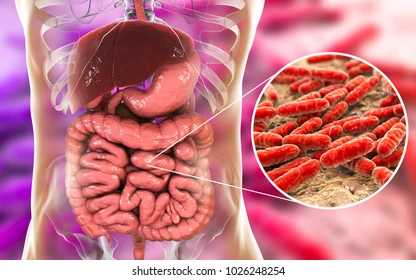
Recently Diagnosed or Relapsed? Stop Looking For a Miracle Cure, and Use Evidence-Based Therapies To Enhance Your Treatment and Prolong Your Remission
Multiple Myeloma an incurable disease, but I have spent the last 25 years in remission using a blend of conventional oncology and evidence-based nutrition, supplementation, and lifestyle therapies from peer-reviewed studies that your oncologist probably hasn't told you about.
Click the orange button to the right to learn more about what you can start doing today.
- You are here:
- Home »
- Blog »
- Multiple Myeloma »
- Myeloma Therapy Damages Gut
Myeloma Therapy Damages Gut

According to the second study linked below myeloma therapy damages gut. Long-term possibly permanent damage. Fortunately, MM patients can take steps to prevent or heal this damage.
One of the most commonly asked questions on the many MM themed online groups is about all things gut health related. Meaning questions about nausea, diarrhea, constipation, etc. etc. Both short, long-term. The study linked below sheds light on the probable reasons.
I am a long-term myeloma survivor. I’ve tried to dismiss the gastrointestinal problems that I’ve experienced since my active treatment for MM in ’94,’95 and ’96. Like many of the posts on PeopleBeatingCancer, a chance discovery of an article caused me to research the issue on the internet. This post is the result of research coupled with my experience.
Understand that myeloma therapy damaging gut health that I’m writing about in this post is long-term or possibly permanent damage.
How does chemotherapy and radiation damage the patient’s intestinal health long-term?
- Cell Damage: Chemotherapy and radiation therapy can damage the cells lining the intestines, leading to inflammation, ulceration, and erosion of the intestinal lining. This damage can impair the intestine’s ability to absorb nutrients and fluids properly.
- Changes in Microbiota: The gut microbiota, the community of microorganisms living in the intestines, plays a crucial role in maintaining gut health. Chemotherapy and radiation therapy can alter the composition of the gut microbiota, leading to dysbiosis (an imbalance in gut bacteria), which can contribute to gastrointestinal symptoms and long-term intestinal health issues.
- Impaired Nutrient Absorption: Damage to the intestinal lining can impair the absorption of nutrients, including vitamins, minerals, and electrolytes. This can lead to deficiencies in essential nutrients, affecting overall health and potentially leading to long-term complications such as malnutrition.
- Diarrhea and Gastrointestinal Symptoms: Chemotherapy-induced diarrhea and radiation-induced enteritis are common side effects of these treatments. These gastrointestinal symptoms can persist long-term in some patients, affecting their quality of life and nutritional status.
- Increased Risk of Secondary Cancers: Radiation therapy, in particular, can increase the risk of developing secondary cancers in the gastrointestinal tract due to the exposure of healthy tissues to radiation. These secondary cancers can further impact intestinal health and overall well-being.
- Chronic Inflammation: Chemotherapy and radiation therapy can induce chronic inflammation in the intestines, which may contribute to long-term gastrointestinal complications such as inflammatory bowel disease (IBD) or increased risk of colorectal cancer.
- Delayed Healing: The damage caused by chemotherapy and radiation therapy can impair the normal healing process in the intestines, prolonging recovery and increasing the risk of long-term complications.
My goal is to never present a problem in a blog post without offering possible solutions to the problem.
- Pre-Habilitation-
- Melatonin, Resveratrol-
- Hyperbaric Oxygen Therapy (HBOT)
- Low dose therapies aka less toxicity means less damage-
Have you been diagnosed with multiple myeloma? What symptoms? What stage? Let me know if you would like to learn more about evidence-based, non-conventional therapies.
Or maybe you would like to learn more about how myeloma therapy damages gut health? Email me a David.PeopleBeatingCancer@gmail.com
Thank you,
David Emerson
- MM Survivor
- MM Cancer Coach
- Director PeopleBeatingCancer
Associations Between Health Behaviors, Gastrointestinal Symptoms, and Gut Microbiota in a Cross-Sectional Sample of Cancer Survivors: Secondary Analysis from the Chemo-Gut Study
“Conclusions- Overall, most survivors in this study reported consuming a moderately healthy diet and engaging in low intensity exercise a few times a week. Moreover, results provide evidence for associations between antibiotic use and more severe symptoms of belly pain, constipation, and diarrhea. Dietary behaviors including self-rated diet health, and average daily servings of protein were associated with GI symptoms. Antibiotic use, self-rated diet healthiness, fruit, whole grain consumption, and exercise frequency behaviors correlated with specific types of bacterial taxa, but the direction of causality cannot be determined by our analysis and requires further research. Behavioral and dietary-based interventions may be optimally suited to address survivors’ adverse GI symptoms by influencing the gut microbiota. However, larger, prospective trials are needed.”
Gastrointestinal side effects of cancer treatments
“This article outlines the main gastrointestinal side effects seen with radiation therapy, chemotherapy and immunotherapy, and discusses appropriate investigation and management..
Many of the therapies however come with significant adverse effects for survivors of cancer and 25% report impaired quality of life due to chronic physical problems following treatment, of which gastrointestinal (GI) symptoms are the most common and most associated with decreased quality of life…
Radiation therapy causes ionisation within tissues that absorb the high-frequency X/γ rays used. Reactive oxygen species are produced which cause apoptosis and necrosis within all cells; both benign and malignant.
These toxic compounds acutely damage the gut and subsequently persistent cytokine activation in the submucosa leads to ischaemia and fibrosis. Irreparable damage to DNA results in a loss of stem cells.4
There are a number of risk factors that increase the risk of radiation toxicity:
- higher radiation dose,
- longer treatment duration,
- increased area of bowel involved
- and concurrent chemotherapy
increase the likelihood of developing toxicity. In the context of multimodality cancer treatments, chemotherapy increases the sensitivity of noncancerous tissues to damage from radiotherapy.
Those receiving radiation to a pelvic/abdominal/thoracic malignancy commonly experience GI side effects if the GI structures are located within the radiation field resulting in a range of injuries, including radiation colitis, radiation mucositis and pelvic radiation disease.
After the acute injury gradual fibrotic changes occur over months to years within the submucosal layer with collagen deposition: an occlusive vasculitis is seen with foam cell invasion of the tunica intima and hyaline thickening of the arteriolar walls.
Injury to the small bowel causes it to become thickened. These chronic changes lead to decreased absorption of nutrients. Flatulence, abdominal discomfort and diarrhoea are seen secondary to impaired fat absorption and degradation of lactose, which may also be accompanied by bacterial overgrowth.
Radiation damage to the large intestine can cause a pancolitis which mimics ulcerative colitis, though this is less common than segmental colitis to the areas directly radiated.
The timing of GI symptoms may vary with some occurring acutely and others not arising for years or even decades, which limits the recognition of these late side effects in the published literature.6

